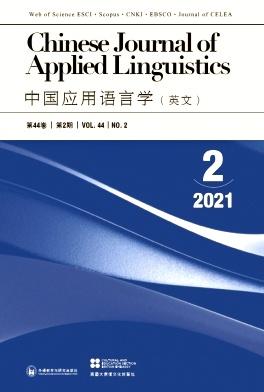Intensifier-Verb Collocations in Academic English by Chinese Learners Compared to Native-Speaker Students
IF 1.1
4区 教育学
Q3 EDUCATION & EDUCATIONAL RESEARCH
引用次数: 1
Abstract
Abstract It is difficult for L2 English learners in general, and especially Chinese learners of English, to form idiomatic collocations. This article presents a comparison of the use of intensifier-verb collocations in English by native speaker students and Chinese ESL learners, paying particular attention to verbs which collocate with intensifiers. The data consisted of written production from three corpora: two of these are native English corpora: the British Academic Written English (BAWE) Corpus and Michigan Corpus of Upper-Level Student Papers (MICUSP). The third one is a recently created Chinese Learner English corpus, Ten-thousand English Compositions of Chinese Learners (TECCL). Findings suggest that Chinese learners of English produce significantly more intensifier-verb collocations than native speaker students, but that their English attests a smaller variety of intensifier-verb collocations compared with the native speakers. Moreover, Chinese learners of English use the intensifier-verb collocation types just-verb, only-verb and really-verb very frequently compared with native speaker students. As regards verb collocates, the intensifiers hardly, clearly, well, strongly and deeply collocate with semantically different verbs in native and Chinese learner English. Compared with the patterns in Chinese learner English, the intensifiers in native speaker English collocate with a more stable and restricted set of verb collocates.中国学生与母语学生在学术英语中强调动词搭配的比较
摘要二语英语学习者,尤其是中国英语学习者很难形成地道的搭配。本文比较了以英语为母语的学生和中国ESL学习者在英语中使用强化动词搭配的情况,特别注意与强化词搭配的动词。数据由三个语料库的书面产出组成:其中两个是母语英语语料库:英国学术书面英语语料库(BAWE)和密歇根州高级学生论文语料库(MICUSP)。第三个是最近创建的中国学习者英语语料库《中国学习者的一万篇英语作文》(TECCL)。研究结果表明,中国英语学习者产生的强化动词搭配明显多于母语学生,但与母语学生相比,他们的英语强化动词搭配的种类较少。此外,与母语为英语的学生相比,中国英语学习者使用强化动词搭配类型的频率非常高。在动词搭配方面,在母语和汉语学习者英语中,强化词几乎、清晰、良好、强烈、深入地与语义不同的动词搭配。与中国英语学习者的模式相比,母语为英语的强化词搭配了一组更稳定、更受限制的动词搭配。
本文章由计算机程序翻译,如有差异,请以英文原文为准。
求助全文
约1分钟内获得全文
求助全文
来源期刊

Chinese Journal of Applied Linguistics
EDUCATION & EDUCATIONAL RESEARCH-
CiteScore
1.50
自引率
0.00%
发文量
377
期刊介绍:
The Chinese Journal of Applied Linguistics (CJAL) (formerly known as Teaching English in China – CELEA Journal) was created in 1978 as a newsletter by the British Council, Beijing. It is the affiliated journal of the China English Language Education Association (founded in 1981 and now the Chinese affiliate of AILA [International Association of Applied Linguistics]). The Chinese Journal of Applied Linguistics is the only English language teaching (ELT) journal in China that is published in English, serving as a window to Chinese reform on ELT for professionals in China and around the world. The journal is internationally focused, fully refereed, and its articles address a wide variety of topics in Chinese applied linguistics which include – but also reach beyond – the topics of language education and second language acquisition.
 求助内容:
求助内容: 应助结果提醒方式:
应助结果提醒方式:


